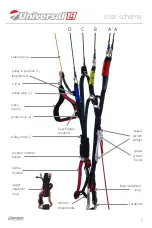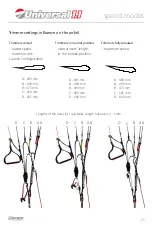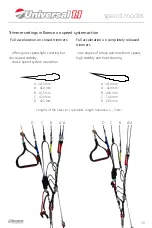
Adjust your heading regularly when winched, so no large
corrections are necessary. Remember there are several
conditions to be met when winching:
n
pilot should be properly trained for winching,
n
the winch with all gear should be in good condition and
specialized for paraglider winching,
n
the winch operator must be properly trained in winching and
servicing the gear,
n
Universal 1.1 must not be winched with forces exceeding 90
daN, and under any circumstances must not be towed by any
vehicle not equipped properly or controlled by unskilled
operator.
First powered flights
In order to get familiar with your wing we recommend at first flying
with the trimmers closed since in this configuration the Universal
1.1 behaves as a classic wing.
Once you feel confident with your wing, you can start
experimenting with faster trim settings and speed system. Use all
additional speed and vigor of the Universal 1.1.
Caution:
Before each launch it is necessary to have a
thorough check of the paraglider, harness and power unit
(see page 14).
Classic launch with no wind
Even when it seems that there is no wind at all, it is rarely so.
Therefore always be careful in determining the conditions, since in
PPG flying it is most important that the launch and initial climb are
performed with a head wind (the danger of losing your airspeed
while steep crossing of the wind gradient is greatly reduced then).
Special attention must be paid to trees, power lines and other
powered flights - launch
19
!
Summary of Contents for Universal 1.1 23
Page 1: ...user manual V 07 07 2018 BASIC risers ...
Page 46: ...46 rigging scheme ...




































